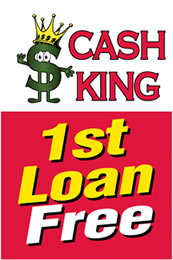Best Practices Standards
Cash King strongly believes that education about the payday advance industry is vital for both the public and legislators.
We follow the “Best Practices” standards below.
- Full disclosure. A member will comply with the disclosure requirements of the state in which the payday advance office is located and with federal disclosure requirements including the Federal Truth in Lending Act. A contract between a member and the customer must fully outline the terms of the payday advance transaction. Members agree to disclose the cost of the service fee both as a dollar amount and as an annual percentage rate (“APR”). A member, in compliance with CFSA guidelines where they do not conflict with applicable federal, state or local requirements, will further ensure full disclosure by making rates clearly visible to customers before they enter into the transaction process.
- Compliance. A member will comply with all applicable laws. A member will not charge a fee or rate for a payday advance that is not authorized by state or federal law.
- Truthful advertising. A member will not advertise the payday advance service in any false, misleading, or deceptive manner, and will promote only the responsible use of the payday advance service.
- Encourage consumer responsibility. A member will implement procedures to inform consumers of the intended use of the payday advance service. These procedures will include the placement of a “Customer Notice” on all marketing materials, including all television, print, radio and on-line advertising, direct mail and in-store promotional materials.
- Rollovers. Members shall not allow customers to rollover a payday advance (the extension of an outstanding advance by payment of only a fee) unless expressly authorized by state law, but in such cases where authorized the member will limit rollovers to four (4) or the state limit, whichever is less.
- Right to rescind. A member will give its customers the right to rescind, at no cost, a payday advance transaction on or before the close of the following business day.
- Appropriate collection practices. A member must collect past due accounts in a professional, air and lawful manner. A member will not use unlawful threats, intimidation, or harassment to collect accounts. CFSA believes that the collection limitations contained in the Fair Debt Collection Practices Act (FDCPA) should guide a member’s practice in this area.
- No criminal action. A member will not threaten or pursue criminal action against a customer as a result of the customer’s check being returned unpaid or the customer’s account not being paid.
- Enforcement. A member will participate in self-policing of the industry. A member will be expected to report violations of these Best Practices to CFSA, which will investigate the matter and take appropriate action. Each member company agrees to maintain and post its own toll-free consumer hotline number in each of its outlets.
- Support balanced legislation. A member will work with state legislators and regulators to support responsible legislation of the payday advance industry that incorporates these Best Practices.
- Extended Payment Plan*. Each member will provide customers who are unable to repay a payday advance according to their original contract the option of repaying the advance over a longer period of time. Such an extended payment plan will be offered in compliance with any requirement in state law to provide an extended payment plan or, in the absence of such a requirement in state law, in compliance with the Best Practice “Guidelines for Extended Payment Plans”. A member will adequately disclose the availability of the Extended Payment Plan to its customers in compliance with any requirement in state law for such a disclosure or, in the absence of such a requirement in state law, in compliance with the Best Practice “Guidelines for Extended Payment Plans”.



